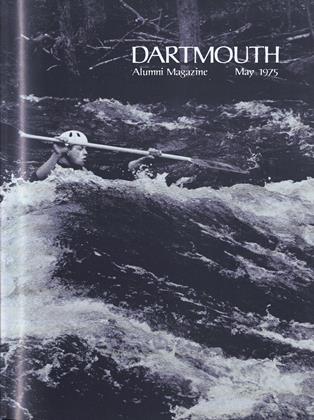"Ford people always were fanatics" - and with every good reason, NORMAN FREDERIC PAGE '27 believes.
A while back, a letter addressed to "Pike Bros., Page, N.H.," was delivered promptly to Fred Page in Pike, New Hamp-shire. A minor miracle in an impersonal age, but nonetheless understand-able. For whatever eminence he achieved as senior vice president of the American Express Company - and considerable it was - it could scarcely rival his reputation as "Mr. Model A."
Captivated by the now-classic Model A since 1928, when he paid $500 for a shiny new roadster, Page has been buying and selling, rebuilding and restoring antique cars from the time he acquired a long-coveted 1931 phaeton in 1950. What started as a hobby grew by 1955 into a part-time business, run for the first few years by his sons, Buzz '60 and John. Until his retirement in 1965, Page supervised the operation weekends from the family home in Haverhill or the farm in nearby Pike.
The current listing of Page's Model A Garage includes more than 125 cars, from a 1930 tudor sedan - "not too hopeless" at $200 - to a prize 1931 convertible sedan, "Green, cream wheels. Original motor, chassis and paint. Matched rubber, white naugahyde top. Speedometer shows 6,000 miles," which Page purchased, hardly used, in 1955 and might "start talking about selling" for $25,000. Hundreds more in various states of disrepair are stashed away in area barns, awaiting restoration or dismantling for recoverable parts.
Page buys his cars everywhere. If there's a Model A in the area, he or one of his garage men is likely to hear about it. Some he finds through ads; a good many he buys from foreign suppliers. Old parts come from junked cars and dealers going out of business, new ones from manufacturers in 15 countries mufflers from South Africa, for instance.
His customers, too, come from all over. While most people want "as-is" or partly restored cars to work on themselves, most of the profit comes from the sale of completely rebuilt Model A's. A few years ago, a Missouri buff bought, sight unseen, for $2,500 a rare '32 Model B roadster which would be worth up to $12,000 now. A 1929 green roadster, still in final stages of remanufacture from authentic parts, new and reclaimed, is priced at $5,950 on the current list, and it doesn't qualify as a show car.
Classic Ford fanciers come in all ages. "I've had hundreds of father-son combinations as customers," Page recalls. "Pop grew up with them, bought himself an old Model A to fix up with money he made as a kid, and his sons have learned to have fun with them the way he did."
But it's not only nostalgia that makes the Model A a collector's dream car of the 1970s, Page says. While the older Motel T is "past the point of being usable on the road - and the A was getting borderline before the 55-mile-an-hour speed limit - a Model A, with only 5,000 parts, is a car you can use and at the same time take apart and put together yourself."
Where Ford people were fanatics, he contends, "Chevy people just bought transportation. A '31 Chevy had a body made of soft wood and tin, and it didn't hold up. But a Ford of the same year was made of hard wood and steel, and its doors still close better than a '74 model." He puts it simply: "One skimped; one didn't."
Page grew up in Woodsville, New Hampshire, where his father, Norman J. Page '95, was superintendent of schools. An expert stenographer at his father's insistence, Fred typed his way through college and into the American Express executive suite. In college, "I worked for everyone but the President," acting as departmental secretary, typing sermons for the chaplain and local ministers and theses for faculty members, and assisting Tuck Professor Harry Wellman '07 with his placement service. When an opening with American Express turned up, Page figured a job with the Paris office might allow him to carry his French major into graduate work at the Sorbonne. Instead, as the only male secretary with a college degree in New York headquarters, he shortly became assistant to the executive vice president. He was made a director in 1951, senior vice president in 1952, and secretary of the corporation in 1953.
Page's interest in romance languages and his collector's instinct have taken him into other fields, to the great benefit of the College. A rare-book man, he has specialized in Don Quixote, and more than a decade ago presented his 2,000-volume Cervantes collection, the earliest a 1607 edition, as well as Henry Ford holdings and other valuable books, to Baker Library.
Of all the hats Fred Page has worn with distinction, however, none seems to fit him better than the cap of the proprietor of Page's Model A Garage.
 View Full Issue
View Full Issue
More From This Issue
-
 Feature
FeatureBeating the Odds
May 1975 By IRVING H. LEVITAS, M.D. -
 Feature
FeatureBlack in the White Academy
May 1975 By WARNER R.TRAYNHAM -
 Feature
FeatureRalph Sterner: See-er
May 1975 By RALPH STEINER -
 Feature
FeatureA MEMORANDUM
May 1975 By JAMES L. FARLEY '42 -
 Article
ArticleWhere the Grass Looks Green
May 1975 By JACK DEGANGE -
 Class Notes
Class Notes1948
May 1975 By FRANCIS R. DRURY JR., HARTHON I. MUNSON
M.B.R.
-
 Feature
FeaturePort Professional
October 1973 By M.B.R. -
 Article
ArticleTop Yard Cop
December 1973 By M.B.R. -
 Article
ArticleM for Mystifier
March 1975 By M.B.R. -
 Article
ArticleThe obscure little pin-prick circled above recently sent out x-rays more intense than any before recorded. But what is this "unusual thing" in the sky?
October 1975 By M.B.R. -
 Article
ArticleJazz Man
December 1975 By M.B.R. -
 Article
ArticleTracker of the Right Stuff
March 1980 By M.B.R.








